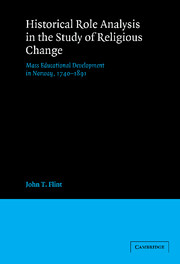 Historical Role Analysis in the Study of Religious Change
Historical Role Analysis in the Study of Religious Change A concern with the prerequisites for and consequences of mass educational development has been a recurrent theme in both the history and historiography of those societies where knowledge and skills based on literacy were regarded as preconditions for power and economic growth. Systematic comparative study of this interplay has been devoted in large measure to educational correlates of nation-building and economic growth since 1950. Economic historians and others have drawn renewed attention to a similar range of phenomena in the preindustrial West and Japan.
Partial explanations for the differential timing and tempo of mass as opposed to elite literacy diffusion in preindustrial settings have been constructed from variations in the content and articulation of role, ritual, and belief systems within and between the major world religions. Thus, Western religions of The Book have, in principle, been more conducive to mass literacy than Eastern religions of The Way. Egalitarian organization combined with inner-worldly life orientations produced a literate laity well before reading skills were required by new technologies or an expanding electorate. Where less egalitarian modes of religious role organization prevailed, as in the state churches of Germany and Scandinavia, popular education was promoted, initially, by laicized or lay-oriented varieties of Lutheran pietism in tension with Orthodox clericalism as part of absolutist styles of administration.
To save this book to your Kindle, first ensure [email protected] is added to your Approved Personal Document E-mail List under your Personal Document Settings on the Manage Your Content and Devices page of your Amazon account. Then enter the ‘name’ part of your Kindle email address below. Find out more about saving to your Kindle.
Note you can select to save to either the @free.kindle.com or @kindle.com variations. ‘@free.kindle.com’ emails are free but can only be saved to your device when it is connected to wi-fi. ‘@kindle.com’ emails can be delivered even when you are not connected to wi-fi, but note that service fees apply.
Find out more about the Kindle Personal Document Service.
To save content items to your account, please confirm that you agree to abide by our usage policies. If this is the first time you use this feature, you will be asked to authorise Cambridge Core to connect with your account. Find out more about saving content to Dropbox.
To save content items to your account, please confirm that you agree to abide by our usage policies. If this is the first time you use this feature, you will be asked to authorise Cambridge Core to connect with your account. Find out more about saving content to Google Drive.